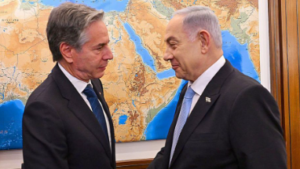Tags: Gaza Ceasefire, US-Israel Relations, Antony Blinken, Benjamin Netanyahu, Middle East Diplomacy
SEO Title: US Criticizes Israeli PM Netanyahu’s ‘Maximalist’ Ceasefire Stance Amid Tensions
SEO Meta Description: The US criticizes Israeli PM Netanyahu’s stance on the Gaza ceasefire, labeling it as “maximalist” and counterproductive to peace talks. Secretary Blinken’s proposal faces challenges.
URL: us-criticizes-netanyahu-maximalist-ceasefire-stance
Headline: US Criticizes Netanyahu’s ‘Maximalist’ Stance on Gaza Ceasefire
In a significant diplomatic development, the United States has sharply criticized Israeli Prime Minister Benjamin Netanyahu’s recent comments on the Gaza ceasefire negotiations. A senior US official, speaking on condition of anonymity, described Netanyahu’s “maximalist statements” as counterproductive to securing a ceasefire agreement between Israel and Hamas.
The criticism comes amid an intense round of regional diplomacy led by US Secretary of State Antony Blinken, who is pushing for progress on a ceasefire and hostage release deal. On Monday, Blinken engaged in a three-hour meeting with Netanyahu in Jerusalem, where discussions centered around Washington’s “bridging proposal” aimed at resolving key sticking points in the negotiations.
Following the meeting, Netanyahu reportedly told families of hostages that he had “convinced” Blinken that Israeli troops must remain in certain strategic areas of Gaza, including along the southern border with Egypt. These comments have reportedly irritated the US administration.
“We saw the prime minister’s comments, specifically on some of these items,” the senior US official said. “Maximalist statements like this are not constructive to getting a ceasefire deal across the finish line and risk derailing technical talks necessary for implementation.”

The US official’s remarks came after Blinken’s meetings with Egyptian President Abdel Fattah al-Sisi in El-Alamein, where Egypt expressed strong opposition to the idea of Israeli troops remaining near its border in Gaza. After Egypt, Blinken continued his diplomatic efforts in Doha, Qatar.
During an interview with the BBC, Blinken revealed that the US bridging proposal includes a “detailed plan” for Israeli withdrawal from Gaza. “The agreement is very clear on the schedule and locations of IDF [Israel Defense Forces] withdrawals from Gaza, and Israel has agreed to that,” Blinken stated.
When asked about Netanyahu’s reported claim that he had convinced Blinken to keep troops in Gaza, the Secretary of State responded, “I can’t speak to what he’s quoted as saying, but I can confirm Israel’s endorsement of the bridging proposal, which includes a clear schedule for withdrawals.”
Hamas, however, has rejected the latest ceasefire proposals, calling them a “coup” against prior agreements and insisting that negotiations revert to the terms discussed in July.
As the situation remains fluid, the US continues its efforts to bring both parties closer to a sustainable ceasefire agreement, despite the challenges posed by differing positions on the ground.
Key Details from Recent Diplomatic Efforts
- Blinken-Netanyahu Meeting: On August 19, 2024, US Secretary of State Antony Blinken met with Netanyahu in Jerusalem for a three-hour discussion focused on resolving critical issues in the ceasefire talks. The meeting was part of Blinken’s broader diplomatic mission across the Middle East, aiming to solidify a ceasefire and secure the release of hostages held by Hamas in Gaza.
- Bridging Proposal: During the meeting, Netanyahu reportedly accepted a US “bridging proposal” designed to address key sticking points in the negotiations. This proposal outlines a phased withdrawal of Israeli Defense Forces (IDF) from Gaza, specifying timelines and locations for the pullout. The plan is seen as a compromise to facilitate broader peace efforts, though it has been met with skepticism from various parties involved.

- Netanyahu’s Controversial Comments: After the meeting, Israeli media reported that Netanyahu informed families of hostages that he had successfully convinced Blinken to allow Israeli troops to remain in strategically important areas of Gaza, including the southern border with Egypt. These comments have sparked concern within the US administration, which views such statements as unhelpful to the negotiation process.
- US Response: A senior US official responded to Netanyahu’s comments, emphasizing that “maximalist statements like this are not constructive to getting a ceasefire deal across the finish line.” The official highlighted the importance of staying focused on the bridging proposal and avoiding public statements that could complicate the delicate negotiations.
Regional Reactions and Ongoing Diplomacy
- Egypt’s Opposition: Egyptian President Abdel Fattah al-Sisi, during talks with Blinken in El-Alamein, strongly opposed the idea of Israeli troops remaining along Egypt’s border in Gaza. Egypt, which shares a border with Gaza, has been a key player in ceasefire negotiations, advocating for a complete Israeli withdrawal from the territory.
- Qatar’s Role: Following his visit to Egypt, Blinken traveled to Doha, Qatar, for further discussions. Qatar has also played a significant role in mediating between Israel and Hamas, providing a platform for indirect negotiations. The country’s involvement underscores the complex web of regional actors influencing the ceasefire process.
- Hamas’ Rejection: In a statement, Hamas rejected the latest ceasefire proposals, calling them a “coup” against previous agreements. The group insists that any ceasefire deal should be based on the terms agreed upon in July, before the current round of negotiations began. Hamas’ position adds another layer of difficulty to achieving a lasting peace agreement.
Background and Historical Context
- Gaza Conflict Overview: The Gaza Strip has been a focal point of the Israeli-Palestinian conflict for decades. Since the militant group Hamas took control of Gaza in 2007, the area has been the site of multiple conflicts with Israel, resulting in significant casualties and destruction. Ceasefires have been periodically brokered, but lasting peace has remained elusive.
- US-Israel Relations: The United States has historically been a close ally of Israel, providing military aid and diplomatic support. However, recent tensions over Israel’s actions in Gaza and its approach to the Palestinian issue have strained the relationship at times. The current situation highlights the challenges the US faces in balancing its support for Israel with broader regional stability.
- Impact on Civilians: The ongoing conflict has had a devastating impact on civilians in Gaza, with thousands of deaths, injuries, and widespread displacement. Humanitarian organizations have repeatedly called for an end to the violence and greater access to aid for those affected.
Future Implications
The outcome of the current ceasefire negotiations could have significant implications for the broader Israeli-Palestinian conflict and US foreign policy in the Middle East. A successful agreement could pave the way for renewed peace talks, while failure to reach a deal could lead to further escalation of violence.
As the US continues its diplomatic efforts, the international community is watching closely, hoping for a breakthrough that could bring lasting peace to the region.






